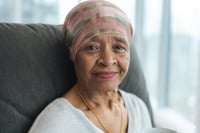Integrative Oncology Care May Reduce Emotional Distress in Cancer Patients

Cancer patients undergoing chemotherapy who regularly attended a weekly integrative oncology program had lower levels of depression, anxiety, and sleep problems than patients who did not regularly attend the program, according to a report in Psycho-Oncology.
“Emotional distress is one of the leading challenges facing supportive and palliative oncology care,” wrote Eran Ben‐Arye, M.D., of Technion‐Israel Institute of Technology in Haifa, Israel, and colleagues. Several studies have suggested that integrative oncology care—which combines complementary therapies with conventional cancer treatments—may reduce some symptoms in patients with cancer. Ben-Arye and colleagues specifically focused on the impact of such programs on emotional distress in cancer patients.
They examined data from 439 adults who received personalized integrative oncology care while undergoing chemotherapy for localized cancer (stages 1-3). After an initial hour-long consultation, patients were invited to attend weekly 30- to 45-minute integrative oncology sessions tailored to their needs. These sessions included guidance on herbal supplements, acupuncture, reflexology, music therapy, and more.
The researchers evaluated patients’ depression, anxiety, and sleep quality using the Edmonton Symptom Assessment Scale (ESAS) and quality of life was assessed with the European Organization for Research and Treatment of Cancer Quality of Life Questionnaire (EORTC) at baseline and six weeks later. They compared outcomes in 260 patients who attended at least four integrative oncology sessions over a six-week period with 179 patients who attended fewer sessions.
After six weeks, the patients who attended four or more integrative oncology sessions showed significantly greater improvements in both ESAS and EORTC scores compared with patients who attended fewer sessions. The benefits of attending the integrative oncology sessions were most pronounced in patients with moderate or high anxiety levels (ESAS anxiety scores of 4 to 10) at baseline.
“Patients with baseline mild ESAS anxiety showed no improvement for any of the study outcomes, with some in the high- and low‐[adherence to integrative oncology] groups reporting worsening ESAS anxiety scores at six weeks,” the researchers noted. “The reduced beneficial effect of the [integrative oncology] program on emotional distress in patients with low baseline ESAS anxiety scores presents an opportunity to explore this unique subgroup of patients. It is possible that what appears to be a worsening of ESAS anxiety scores in this group at six weeks was not due to symptom progression but rather an increased willingness to open up with time to the [integrative physicians and integrative oncology] practitioners.”
To read more on this topic, see the Psychiatric News article “Understanding the Breadth and Depth of the Subspecialty: Psycho-Oncology.”






